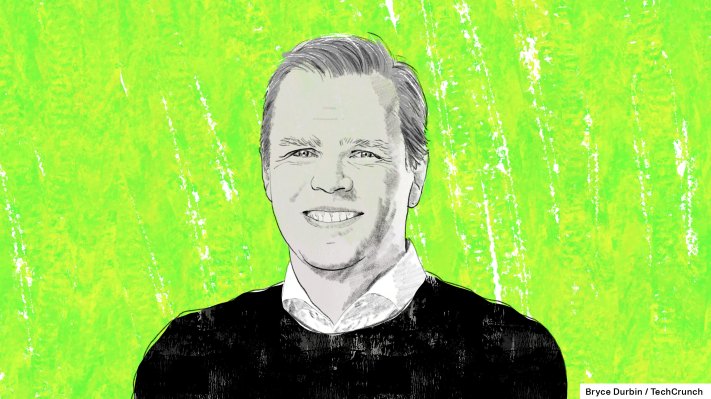Business
Einride founder Robert Falck on his moral obligation to electrify autonomous trucking

Robert Falck used to work at a Russian trucking factory by day, and by night, he built a nightclub guest list startup. He also collects old books, and once guessed that Chinese author Gao Xingjian would win the Nobel Prize in literature. He grew up on a farm, but has degrees in finance, economics and mechanical engineering.
No, this isn’t a game of two truths and a lie — indeed, these are snippets from the life of a serial entrepreneur who harbors a vendetta against the carbon emissions produced by the world’s trucking industry.
Falck, now the CEO and founder of Swedish autonomous freight company Einride, also worked as the director of manufacturing engineering assembly at Volvo GTO Powertrain. He learned how heavy duty vehicles are produced en masse during his three-and-a-half years there, and also helped start and invest in other companies. Einride, which he founded in 2016, is his seventh company.
Einride’s business is threefold. It currently operates one of Europe’s largest fleets of electric trucks, but its main offering is its electric autonomous pods, self-driving freight trucks built without a front cab and no room for a human operator. The startup also offers an IoT system called Saga that runs through its fleet and helps the company and its shipping partners optimize routes, and manage and electrify fleets.
Einride launched its U.S. operations this month and plans to operate its pods, trucks and OS with partners like GE Appliances, Bridgestone and Oatly. In May, the company raised $110 million to help fund its U.S. expansion, bringing its total funding to $150 million.
We sat down with Falck to talk about Einride’s strategy for scaling revenue, the need for autonomous vehicles to be built on electric platforms and why the future is in startups’ hands.
“The average OEM will need to write off between six and seven years of profit to get rid of the legacy investments in diesel platforms.”
The following interview, part of an ongoing series with founders who are building transportation companies, has been edited for length and clarity.
TechCrunch: In addition to your work at Volvo, you’ve started two nightclub-related platforms and a hunting app. Why start an autonomous trucking company?
Robert Falck: Working at Volvo, producing diesel engines, gearboxes and trucks, made it clear to me the challenges the industry was facing and that I have a moral obligation. I mean, the heavy freight transport industry stands for between 7% to 8% of global CO2 emissions, and the engines that I helped to produce contribute roughly 1% of global CO2 emissions. That’s how much of an impact my previous position was actually making, and I realized that I was part of the problem.
It doesn’t exactly make sense to start a company. You’re either crazy, or if you’re in it for money, you’re not going to get there, because there are much easier ways to make money. But for me, I consider the CO2 emissions to be our generation’s greatest challenge. And it’s quite fascinating how secondary failure becomes when you know that you do it for the right reasons.
You have been described as a serial entrepreneur. Are you with Einride for the long run, or are you already thinking about your next startup?
I think all entrepreneurs get a thrill out of entrepreneurship. And I’m definitely more of an entrepreneur and company builder than I am an administrator and manager. I’m not the kind of person to sit there and keep the status quo. It’s not my thing.
So will your next startup tackle CO2 emissions, but just in a different industry?
A lot of the very traditional industries are ready for disruption, and that’s going to challenge and change society at its core. The main driver behind it is that if you look globally, there’s a huge demand for sustainability.
I think most of the companies that are going to change or save the planet will be created in the next five to 10 years, and there’s lot of potential in some of the more traditional parts of the economy. Everything from trucking and the automotive space to real estate, a lot of those big plays are still up for grabs. I think energy — smart grids and how we structure energy production — is going to be another one of them.
So you think most of the climate tech that’ll solve the biggest issues will come from startups rather than legacy companies?
-

 Entertainment6 days ago
Entertainment6 days agoWhat’s new to streaming this week? (Jan. 17, 2025)
-

 Entertainment6 days ago
Entertainment6 days agoExplainer: Age-verification bills for porn and social media
-

 Entertainment5 days ago
Entertainment5 days agoIf TikTok is banned in the U.S., this is what it will look like for everyone else
-

 Entertainment5 days ago
Entertainment5 days ago‘Night Call’ review: A bad day on the job makes for a superb action movie
-

 Entertainment5 days ago
Entertainment5 days agoHow ‘Grand Theft Hamlet’ evolved from lockdown escape to Shakespearean success
-

 Entertainment5 days ago
Entertainment5 days ago‘September 5’ review: a blinkered, noncommittal thriller about an Olympic hostage crisis
-

 Entertainment5 days ago
Entertainment5 days ago‘Back in Action’ review: Cameron Diaz and Jamie Foxx team up for Gen X action-comedy
-

 Entertainment5 days ago
Entertainment5 days ago‘One of Them Days’ review: Keke Palmer and SZA are friendship goals
















